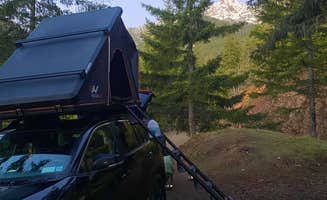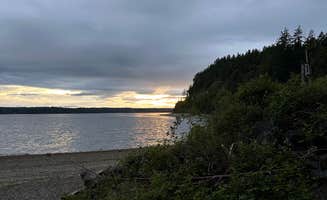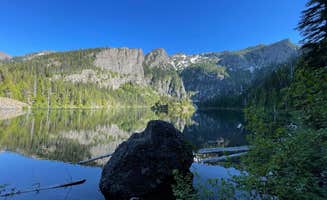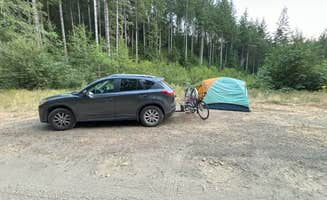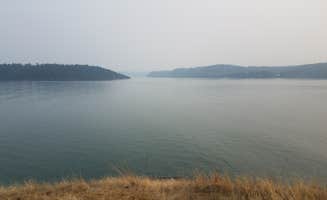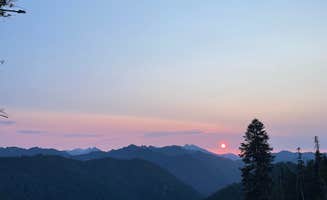Dispersed camping near Poulsbo, Washington offers accessibility within a 60-minute drive radius in multiple directions. The region features several distinct climate zones, with coastal areas averaging 10-15 degrees warmer than higher elevation forest sites during spring and fall months. Forest service roads 2292, 2419, and 27 provide the majority of free primitive campsites, with road conditions generally manageable for passenger vehicles except after heavy rainfall.
What to do
Creek exploration: Multiple camping spots along NF-2419 feature small stream crossings where visitors can cool off in summer. "Great avenue to get out into nature with various streams crossing the path of the service road. Truly magical place," notes one camper at NF-2419 Dispersed Site.
Blackberry picking: Late summer visitors can harvest wild blackberries at several forest pullouts. "There were blackberry plants all over the place," reports a camper at NF-2419 Dispersed Pullout, which provides a large space for multiple vehicles.
Wildlife spotting: Forest Road 2292 offers ridge access for early morning wildlife viewing. "East of the campsite there is a walking trail that takes you to an overlook, perfect for watching the sunrise," mentions one camper who frequently visits this secluded area.
Beach activities: Walk the shoreline or fish from the dock at waterfront sites. "Long dock in the area where you can go fishing. You can walk along the beach as well," notes a recent visitor to Joemma Beach State Park.
What campers like
Privacy levels: The further up forest roads you travel, the more seclusion you'll find. At FS-2292 Dispersed, campers report exceptional privacy: "We stayed here and heard maybe 1 car the whole day/night. Granted, we found a pull off into the woods."
Cell service variability: Coverage differs dramatically by carrier and elevation. "Cell phone service for Cricket was great. Not so much for Verizon!" reports a camper at Hilltop Camp on Forest Road 2419, while another notes "I had 4g on my Tmobile" at NF-2419.
Road accessibility: Most dispersed camping roads require moderate clearance but remain passable for standard vehicles. "The road wasn't bad" notes a camper at NF-2419 Dispersed Pullout, while another visitor to Forest Road 2419 mentions, "My 2011 Ford Flex made it up no problem."
Stargazing conditions: Higher elevation sites offer excellent night sky viewing without light pollution. A winter visitor to Hilltop Camp reported "no light pollution or car sounds at night" despite cold December temperatures.
What you should know
Site availability patterns: Weekday arrivals significantly improve chances of securing prime spots. "Mid week after Labor Day, I had my choice of sites arriving in late afternoon," reports a visitor to Joemma Beach State Park about the small campground.
Winter preparedness: Snow appears frequently at higher elevations, even in early spring. "Please be aware it's at the snow line and very cold in March!" warns a camper at Hilltop Camp, while another notes "got a little snow on the roof in the morning" when staying at Top of the Hill camping.
Road traffic varies: Some forest roads see more traffic than others, affecting noise levels. "NF-2419 is a very busy road at all hours. 2 or 3 cars drive by all day and all through the night," reports a camper, contrasting with the quieter FS-2292.
Insect preparation: Bugs can be prevalent, especially near water sources. "Lots of mosquitoes around," notes a visitor to NF-27 Tunnel Creek, while another camper at FS-2292 simply states "Lots of bugs."
Tips for camping with families
Site selection: Choose pullouts with adequate space between camp and roadway. "This is a great spot to stay for a bit if you're looking to do that OR just stay for a night. It's like, a big circle that you pull in and out of," explains a visitor to NF-27 Tunnel Creek.
Wildlife encounters: Wildlife viewing opportunities create memorable experiences. "Got to feed 3 Bluejays by hand with my oldest one of our new favorite memories," shares a family who camped at NF-2419.
Group size considerations: Some areas accommodate larger family gatherings better than others. "Plenty of space if you have a decent sized group. Easily accommodating 3 cars," notes one camper about NF-27 Tunnel Creek, while FR27 Landing reportedly "could easily fit about 5 cars here."
Campground dynamics: State park campgrounds may offer more social interactions. "As a local, this is also the spot where you go to camp and party with friends and family. So if you're looking for quiet, that's not always the case here," explains a Joemma Beach State Park visitor.
Tips from RVers
Pull-through options: Several forest road sites feature natural loops or turnarounds. "It's a big circle that you pull in and out of," describes a visitor with a rig at NF-27 Tunnel Creek, noting "We have plenty of space with our rig."
Overflow options: When main sites are full, larger pullouts serve as backup locations. "Not the most private spot if vehicles were to pass. The road looks like it's used but no one around when we arrived," reports a visitor to Large Pull Out on FR 24.
Site leveling: Most forest sites require minimal leveling. "Fairly large and level site with an amazing view," notes a camper about Hilltop Camp, making it suitable for smaller RVs despite the elevation.
Resource planning: No services are available at dispersed sites. "Bring in water and plenty of fire wood," advises a family camping at NF-2419, highlighting the need for self-sufficiency when boondocking near Poulsbo.


